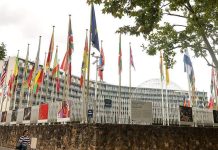By
Raphaël P.P. Dosson
Africa-Press – Tanzania. In his 1992 book The End of History and the Last Man, Francis Fukuyama put forward one of the most challenging and enduring hypotheses in the International Relations corpus. A puzzle seemingly naïve and optimistic in the face of the unshakable aura of a serious and Realist tradition—already scarred by the three major conflict of the 20th century—yet annoyingly pertinent, as the unexpected fall of the Soviet Union and the ascendancy of the Western liberal democratic order seemed to herald the natural Long Peace after humanity’s most violent moment.
When the end of accumulated chaos after the Cold War brought with it the newfound certainty about the conclusion of enduring human struggle, it also planted the expectation of its return.
For the proponents of Fukuyama’s hypothesis, this counterfactual unipolar moment could be seen as a linear progression, sustained by the triad of democracy, trade, and interdependence. For others, it signaled a reminder of our captivity to history and a prelude to the eventual end of the current world order. However, the return of history does not mean its strict repetition. While optimistic views tend to deny the possibility of the emergence of new threats and strongly believe that international relations are conducive to peace and tranquility, pessimistic views suggest the return to a period similar to that of Europe between the World Wars.
Today’s so-called “return to power politics” does not resemble a German-style rise to systemic confrontation, but rather marks a shift away from the U.S.-led Western status quo. The international system, as constructed after the Second World War, has become almost unrecognizable today, owing to the rise of emerging powers, the historic transfer of relative wealth and economic influence from West to East, increasing globalization, transnational forces, and the narrowing gap in power differentials between states.
The failure of the “end of history” thesis stems from two key assumptions: (1) the necessity of a globally adopted democratic order, and (2) the universal acceptance of liberalism as the foundation for human theodicy:
Failure of the Democratic Order
For Fukuyama’s hypothesis to hold, democracy and liberalism would have needed to spread universally, to every country. Yet, this convergence has not occurred. Some states, like China, have embraced aspects of economic liberalism without adopting democratic governance, showing that the liberal-democratic pairing is neither natural nor inevitable.
Even where liberal democracy has spread, it has not consistently demonstrated its superiority. In recent decades, some authoritarian regimes have outperformed democracies in areas such as economic development, social cohesion, and crisis management, challenging the assumption that liberal democracy is the most effective or desirable model. This performance gap has become particularly evident in response to social crises. The COVID-19 pandemic, for instance, exposed how certain authoritarian systems could act more decisively and effectively in times of global emergency. As the world grapples with increasing transnational crises—climate change, resource competition, pandemics, cyber threats, migration—resilience and adaptability may matter more than regime type alone.
Failure of the Liberal Ideal
The “end of history” rationale implies the need for a common ground in defining what is good or evil—a kind of universal theodicy. First, in relation to the democratic-liberal system, the hypothesis that “democracies do not go to war with one another” requires that all inter-state relations be dyadic and democratic. Empirical evidence shows that democracies frequently engage in conflict with non-democracies. U.S. interventions in Iraq, Kuwait, and elsewhere serve as clear examples that being democratic does not guarantee pacifism. This suggests that unless every state becomes democratic, the conditions necessary to prevent war remain unfulfilled. Second, the notion of a political theodicy—the belief that liberalism represents a universally accepted moral endpoint—presumes a consensus beyond foundational political disagreements. It assumes a shared framework for determining the lesser evil in decision-making, balancing what is disagreeable with what is disastrous. But political judgment is inherently shaped by context, trade-offs, and power struggles that are deeply specific to each society. Envisioning a politics free of conflict or power is as unrealistic as expecting global unity under one religion or moral code.
Failure of the Western Neo-Liberal Democratic Order
The exportation of democracy and regime change in authoritarian countries has only strengthened nationalist tendencies and fueled resentment toward Western intervention. For example, framed as democracy promotion, the 2003 U.S. invasion of Iraq and the 2011 NATO intervention in Libya, instead of fostering peace, fueled anti-Western sentiment, destabilized regions, and reinforced norms of self-determination and sovereignty. In response, countries like Russia and China have increasingly advocated for non-intervention, emphasizing national sovereignty. Russia’s 2014 annexation of Crimea and the rise of global nationalist movements further demonstrated the backlash against foreign interference.
In parallel, transnational organizations, once key pillars for maintaining peace, have expanded their memberships but gradually lost relevance in interventions and peace settlements as the Global South rises in power, undermining their legitimacy. Many international organizations, along with the states backing them, have seen their credibility and legitimacy eroded. These organizations now often serve symbolic roles in conflict management, lacking a firm commitment to the rule of law and undermining the normative principles they once upheld. In Northern countries, the widening decision-making powers of these institutions over national governments have triggered political and social instability within liberal states (e.g., the European Union). As a result, national identity and sovereignty have once again become dominant political and social values. The growing extremes in political regimes and the lack of political stability have further fractured the international order, with far-right and far-left parties complicating internal stability and hindering international cooperation.
Economically, while global wealth continues to grow, hyper-globalization has undermined the economic stability of liberal states. As capital shifts to Asia-Pacific and the global supply chains become increasingly fragmented, Western economies face rising cycles of unemployment, worsening inequality, and the erosion of the middle class. These trends have fed domestic discontent, disillusionment with globalization, and populist backlash.
Strategically, the liberal ideal of a borderless, interconnected world—financially, technologically, and politically—has reshaped the very meaning of space and distance in global affairs. Where distance once deterred conflict, globalization has “shrunk the world,” bringing borders, ideas, and populations closer together, but also making them more vulnerable. This interconnectedness, while promising openness, has instead exposed new internal and external threats. As sovereignty and national identity are reasserted in opposition to progressive neo-liberal ideals, disputes over borders and autonomy have re-emerged as central flashpoints of international conflict.
Security frameworks have also deteriorated. Traditional alliances like NATO and the UN, once the backbone of collective security, are increasingly replaced by pragmatic alignments and hedging strategies. These new arrangements reflect growing distrust in traditional balancing mechanisms. At the same time, nuclear proliferation—once controlled through robust non-proliferation regimes—has regained momentum. Powers like China and Russia are advancing vertical proliferation strategies, often in opaque ways, as new technologies (e.g., hypersonic weapons, missile defenses) undermine transparency and deterrence. The once-stable security architecture is now marked by volatility and fragmentation.
These dynamics have heightened what Samuel Huntington predicted as the “Clash of Civilizations.” The ideological and structural divides between North and South, West and East, and core and periphery have grown sharper. Migration, climate change, and a widening economic gap between rich and poor have deepened cultural and geopolitical fault lines. Rather than uniting humanity under a cosmopolitan global order, globalization has intensified civilizational fragmentation.
The very foundations of the Western-led international order—once believed to ensure peace and progress—are now giving way under the weight of their contradictions. These interlinked crises signify not just the decline of the post-Cold War liberal system, but the emergence of a new conception of geopolitics: at the intersection of “geo” (climate change, resource scarcity, environmental degradation) and “politics” (demographic shifts, democratic regression, renewed conflict), a more contested, multipolar, and unstable global reality is taking shape.
Failure of the Western Neo-Liberal Ideology
Ideologies promoted by the Western order appear increasingly outpaced by ongoing systemic transformations.
The momentary “end of history,” facilitated by the Pax Americana, encouraged a retreat from traditional power politics and fostered theoretical frameworks that prioritized social and ideational elements of international society, giving rise to reflectivist-leaning theories that emphasized the “what” of International Relations: its structures, identities, and meanings.
Yet the absence of war was mistaken for the presence of peace. Peace itself was taken for granted. This longest period of peace without direct confrontation between major powers fostered the illusion that global resources and interests could be managed like pieces on a chessboard. Post-WWII peace was built on the hopeful assumption that the newly written rules of the international order would permanently shield humanity from its violent past—an illusion now unraveling.
International Relations theory’s failure to anticipate the USSR’s collapse remains one of the discipline’s most serious blind spots. Much like the fall of the USSR, which once demanded a rethinking of international relations, we are now facing another radical transformation—one that requires an urgent and serious shift in how we approach IR to avoid repeating another major analytical failure.
This moment calls for waking up from the illusion of perpetual peace and recognizing that the “return of history” could just as easily become the “end of history” if we fail to reconnect with the core nature of politics and adapt to the resurgence of multipolar geopolitics. This requires nothing short of a comprehensive relearning of how we study and practice International Relations. The simplistic dichotomy of good versus bad, fair versus unfair, has become a hollow and unproductive framework, particularly when the world’s most economically successful state is an authoritarian socialist regime, when autocracies enjoy high levels of public support, and when regime-type distinctions no longer appear to drive International Relations outcomes as they once did. Leverage over realism through ideological or regime-based arguments is losing its analytical power.
Consider a world where China can build relationships and foster cooperation between some of the most ideologically opposed states—such as Iran and Saudi Arabia—while simultaneously partnering with its own adversaries. Modern international relations are increasingly shaped by a pragmatic and transactional logic, driven by strategic interests that alleviate deep-rooted tensions and reflect a growing trend: former enemies forging new geotechnical partnerships that prioritize interests over ideology and strategy over values.
As Huntington’s vision of worldwide democratization fades and war resurfaces in Europe and the Middle East, strategic regions like Taiwan, the South China Sea, the Strait of Hormuz, the Arctic Circle, and maritime chokepoints such as the Straits of Malacca and Panama become increasingly securitized and entangled in security dilemmas. These developments collectively reveal the inapplicability of the “end of history” hypothesis and underscore the urgent need for new theoretical frameworks. Transition—potentially through war—is no longer a question of if, but when. The failure of Fukuyama’s hypothesis reveals that peace is often circumstantial and temporary—a fragile pause in the continuous cycle of violence to which international relations appear bound.
Just as the conditions for peace create the conditions for war, and the illusion of the “end of history” paved the way for its return, we must break free from the deterministic trap of oscillating between the expectation of peace and the subsequent reaction to war. Churchill’s warning—that those who fail to learn history are condemned to repeat it—misses a deeper truth: humanity may be doomed to repeat history whether we learn it or not.
Learning alone is insufficient; proactive theory and dynamic, context-sensitive understanding can meaningfully intervene in the complex forces shaping the balance of the international system. While International Relations cannot fully escape history, the discipline must move beyond complacent triumphalism of the post-WWII order. Instead, we must prioritize the next 50–75 years of global change—of disruption, emergence, and reordering. If IR is to remain policy-relevant rather than merely theoretically interesting, it must help us engage with multiple, plausible futures, not just assume there will be one.
moderndiplomacy
For More News And Analysis About Tanzania Follow Africa-Press







